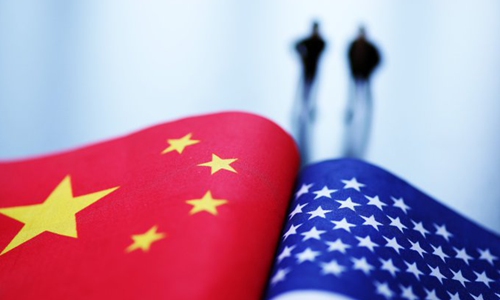Can China-US military ties stay above acrimony?
By Zhang Junshe Source:Global Times Published: 2019/11/18 12:13:02

File photo: IC
The first face-to-face meeting between Chinese State Councilor and Defense Minister Wei Fenghe and US Secretary of Defense Mark Esper on the sidelines of the ASEAN Defense Ministers' Meeting Plus on Monday in Bangkok is hoped to bring about positive results to cordially manage divergences while promoting defense relations. Not long ago, they spoke on a video conference, pledging to maintain stable military ties.
Previously, economic and trade relations formed the cornerstone of China-US ties. Yet after US President Donald Trump assumed office, Washington issued a series of strategic documents, including "National Security Strategy" and "National Defense Strategy," which labeled China as a strategic competitor. It signaled that a new era of great power competition between Beijing and Washington has arrived. The US has carried out a variety of measures to contain China, such as launching the trade war.
Against the backdrop, military ties between the two countries have been relatively stable. During the short meeting between Wei and then acting US defense secretary Patrick Shanahan on the sidelines of the Shangri-La Dialogue in Singapore on May 31, both sides agreed that the two militaries should make their relationship the stabilizer of bilateral relations.
Nevertheless, difficulties in the process should not be ignored. The biggest stumbling block in promoting China-US military ties lies in whether Washington would be willing to respect Beijing's core interests and major security concerns.
Over the years, the US Congress has passed a series of pro-Taiwan acts, which support US arms sales to the island and back Taiwan's participation in international organizations. US Navy has also sent warships through the Taiwan Straits. Since 2015, US naval vessels constantly trespassed into the territorial waters of China's Xisha and adjacent waters of Nansha Islands. After Trump took office, the frequency of such moves increased. Such acts damage military ties.
Not to mention the old issues that have long confounded military relations. Take DeLay Amendment, adopted in 2000 by the US Congress. It prohibits military-to-military exchanges in 12 operational areas between China and the US, because some US policymakers believe that contacts would "create a national security risk due to an inappropriate exposure."
Such moves of the US are related to the growingly tough attitude toward China within US administration. An increasing number of politicians in Washington are now viewing China-US ties with a Cold War mind-set. Because of it, the US is contradicting itself. On the one hand, defense officials have been claiming to seek stable development of military relations with China, including maintaining high-level exchanges and contacts in non-traditional security fields. Yet on the other, the US defense establishment is provoking China over the latter's core interests and major security concerns. It mirrors divergences among US policymakers.
Yet one thing is certain - maintaining stable military ties has been agreed by top officials of the two sides. Some people in the US overemphasized the competition between Beijing and Washington and expected US to pile more pressure on China. However, since both sides have the willingness to convert military ties into the stabilizer of bilateral relations, and they are continuing regular communication, stability will define ties between the two militaries.
So far, high-level visits and exchanges are going on, consultation mechanism, including Military Maritime Consultative Agreement and Asia-Pacific Security Dialogue between the defense departments of China and US are still way.
Both countries hope to maintain healthy and stable military ties when economic relations are leaving a lot to be desired. This will also play a positive role in stabilizing the overall relationship between China and the US.
The author is senior research fellow at the PLA Naval Military Studies Research Institute. opinion@globaltimes.com.cn
Posted in: VIEWPOINT,CHINA-US